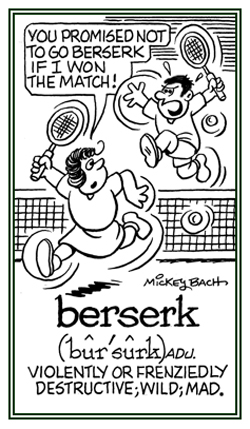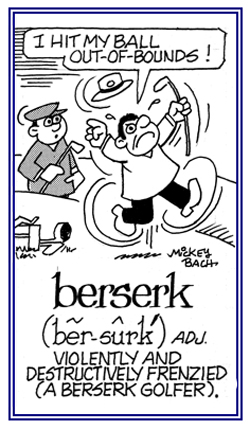You searched for:
“berserk”
berserk
This is an Old Norse term, berserkar which literally means, “bear’s skin”; and refers to a Norse-myth warrior who, wearing a bear's skin, thought he had the strength of a bear and would go berserk when fighting other warriors.
This entry is located in the following unit:
Special Contents of Interest
(page 2)
berserk (adjective), more berserk, most berserk
1. Behaving in an uncontrolled way as a result of anger or irrational feeling: When Rosetta defeated her husband while playing a tennis game, he reacted in a very berserk way.

© ALL rights are reserved.

© ALL rights are reserved.
Go to this Word A Day Revisited Index
2. An informal expression indicating being extremely excited or enthusiastic about something: The crowd went berserk when the movie star finally appeared.
3. Destructively or frenetically violent: The berserk worker started to smash all of the windows.
4. Mentally or emotionally deranged and greatly disturbed: Irene was berserk with grief when her son stumbled and fell down the stairs.
5. Informal: Unrestrained, as with enthusiasm or appetite; wild: The children went berserk over the chocolates.


Go to this Word A Day Revisited Index
for a list of additional Mickey Bach illustrations.
2. An informal expression indicating being extremely excited or enthusiastic about something: The crowd went berserk when the movie star finally appeared.3. Destructively or frenetically violent: The berserk worker started to smash all of the windows.
4. Mentally or emotionally deranged and greatly disturbed: Irene was berserk with grief when her son stumbled and fell down the stairs.
5. Informal: Unrestrained, as with enthusiasm or appetite; wild: The children went berserk over the chocolates.
When people informally say, "the group went berserk", they probably don't realize how extreme such a remark really is.
The adjective comes from the noun berserker, or berserk, which is from the Old Norse word berserkr, “a wild warrior or champion”. Such warriors wore hides of bears, which explains the probable origin of berserkr as a compound of bera, “bear” and serkr, “shirt, coat”.
These berserkers became frenzied in battle, howling like animals, foaming at the mouth, and biting the edges of their iron shields.
The term berserker was first recorded in English in the early 19th century, long after these wild warriors ceased to exist.
If you came here from the amok adverb entry and want to go back to it, you may use this amok link to return there.
Illustrated Vocabulary Quiz #1, Berserk
Illustrated Vocabulary Quiz #1 to challenge your vocabulary skills with words and a picture.

A unit related to:
“berserk”
(Old Norse: berserkar, literally, “bear’s skin”; a Norse-myth warrior)
Word Entries containing the term:
“berserk”
Word Entries at Get Words:
“berserk”
Berserk
Old Norse: berserkar, literally, “bear’s skin”; a Norse-myth warrior unit.
This entry is located in the following unit:
Units of Special Compositions, Topics, or Subjects That Provide Special Information
(page 2)
Wild, mad, and violently destructive. (1)
This entry is located in the following unit:
Word a Day Revisited Index of Cartoons Illustrating the Meanings of Words
(page 18)
